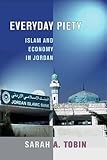Everyday Piety : Islam and Economy in Jordan / Sarah A. Tobin.
Material type: TextPublisher: Ithaca, NY : Cornell University Press, [2016]Copyright date: ©2016Description: 1 online resource (248 p.) : 10 halftonesContent type:
TextPublisher: Ithaca, NY : Cornell University Press, [2016]Copyright date: ©2016Description: 1 online resource (248 p.) : 10 halftonesContent type: - 9781501704192
- 297.095695 23
- online - DeGruyter
| Item type | Current library | Call number | URL | Status | Notes | Barcode | |
|---|---|---|---|---|---|---|---|
 eBook
eBook
|
Biblioteca "Angelicum" Pont. Univ. S.Tommaso d'Aquino Nuvola online | online - DeGruyter (Browse shelf(Opens below)) | Online access | Not for loan (Accesso limitato) | Accesso per gli utenti autorizzati / Access for authorized users | (dgr)9781501704192 |
Frontmatter -- Contents -- Acknowledgments -- Note on Transliteration -- Chapter 1. A Muslim Plays the Slot Machines -- Chapter 2. The History of Amman -- Chapter 3. Making It Meaningful -- Chapter 4. Love, Sex, and the Market -- Chapter 5. Making It Real -- Chapter 6. Uncertainty Inside the Islamic Bank -- Chapter 7. Consuming Islamic Banking -- Chapter 8. Branding Islam -- Notes -- Glossary of Arabic Terms -- Bibliography -- Index
restricted access online access with authorization star
http://purl.org/coar/access_right/c_16ec
Working and living as an authentic Muslim—comporting oneself in an Islamically appropriate way—in the global economy can be very challenging. How do middle-class Muslims living in the Middle East navigate contemporary economic demands in a distinctly Islamic way? What are the impacts of these efforts on their Islamic piety? To what authority does one turn when questions arise? What happens when the answers vary and there is little or no consensus? To answer these questions, Everyday Piety examines the intersection of globalization and Islamic religious life in the city of Amman, Jordan.Drawing on in-depth ethnographic fieldwork in Amman, Sarah A. Tobin demonstrates that Muslims combine their interests in exerting a visible Islam with the opportunities and challenges of advanced capitalism in an urban setting, which ultimately results in the cultivation of a "neoliberal Islamic piety." Neoliberal piety, Tobin contends, is created by both Islamizing economic practices and economizing Islamic piety, and is done in ways that reflect a modern, cosmopolitan style and aesthetic, revealing a keen interest in displays of authenticity on the part of the actors. Tobin highlights sites at which economic life and Islamic virtue intersect: Ramadan, the hijab, Islamic economics, Islamic banking, and consumption. Each case reflects the shift from conditions and contexts of highly regulated and legalized moral behaviors to greater levels of uncertainty and indeterminacy. In its ethnographic richness, this book shows that actors make normative claims of an authentic, real Islam in economic practice and measure them against standards that derive from Islamic law, other sources of knowledge, and the pragmatics of everyday life.
Mode of access: Internet via World Wide Web.
In English.
Description based on online resource; title from PDF title page (publisher's Web site, viewed 26. Apr 2024)


